I watched The Raconteurs and Cat Power on Austin City limits tonight. Jack White and band were playing a song that reminded me of The Band of Gypsies playing Machine Gun at the Fillmore East on New Years Eve 1969. Not sure the name of their song, but it was darn good. Felt like it was one of those songs best heard live. Jack White is uber-cool and I really started liking him when he did some songs for the Cold Mountain soundtrack.
I found this version of Jimi playing at The Isle of Wight. The Filmore East versions, with Buddy Miles on drums instead of The Experience's Mitch Mitchell, are by far the best (they played more than one show). When I put this song on I am completely transported. I know it sounds cliche, but no other music does this to me. Get the "Live At The Fillmore East" 2CD set and put your headphones on and enjoy.
I hesitate to put this out there as THE song because the Fillmore version is much more powerful, but I still like this.
Sunday, December 31, 2006
Jimi
Posted by
Chet
at
1:01 AM
0
comments
![]()
Labels: music
230,000

A fishing ship remains stuck on top of houses in Banda Aceh, Indonesia, two years after a devastating tsunami struck coastal towns along the Indian Ocean.
Thousands of people across the region lit candles, visited graves, and observed moments of silence on Tuesday to commemorate the tragedy. About 230,000 people died and millions more were left homeless when waves traveling as fast as a jet airliner slammed into villages in 11 countries on December 26, 2004.
Posted by
Chet
at
12:57 AM
0
comments
![]()
Thursday, December 28, 2006
Moths drink the tears of sleeping birds

Moths drink the tears of sleeping birds
NewScientist.com news service
Debora MacKenzie
A species of moth drinks tears from the eyes of sleeping birds using a fearsome proboscis shaped like a harpoon, scientists have revealed. The new discovery – spied in Madagascar – is the first time moths have been seen feeding on the tears of birds.
Roland Hilgartner at the German Primate Centre in Göttingen, Germany, and Mamisolo Raoilison Hilgartner at the University of Antananarivo in Madagascar, witnessed the apparently unique sight in the island state’s Kirindy forest.
Tear-feeding moths and butterflies are known to exist elsewhere in Africa, Asia and South America, but they mainly feed on large, placid animals, such as deer, antelope or crocodiles, which cannot readily brush them away. But there are no such large animals on Madagascar. The main mammals – lemurs and mongoose – have paws capable of shooing the moths. Birds can fly away.
But not when they are sleeping. The Madagascan moths were observed on the necks of sleeping magpie robins and Newtonia birds, with the tip of their proboscises inserted under the bird’s eyelid, drinking avidly (scroll down for images). This was during the wet season, so the scientists think the insects wanted salt, as the local soils are low in sodium.
But sleeping birds have two eyelids, both closed. So instead of the soft, straw-like mouthparts found on tear-drinking moths elsewhere, the Madagascan moth has a proboscis with hooks and barbs “shaped like an ancient harpoon”, Hilgartner says.
This can be inserted under the bird’s eyelids, where the barbs anchor it, apparently without disturbing the bird. The team does not yet know whether the insect spits out an anaesthetic to dull the irritation. They also want to investigate whether, like their counterparts elsewhere, the Madagascan tear-drinkers are all males who get most of their nutrition from the tears.
Journal reference: Biology Letters (DOI: 10.1098/rsbl.2006.0581)
Posted by
Chet
at
7:33 PM
1 comments
![]()
Thursday, December 21, 2006
Tuesday, December 19, 2006
The Persuaders
Check out The Persuaders. I think I'll use it in my class this semester.
Posted by
Chet
at
10:07 PM
0
comments
![]()
Quote of the afternoon
". . . once language exists only to convey information, it is dying."
--Richard Hugo
Posted by
Chet
at
7:07 PM
1 comments
![]()
Labels: Quote O' The Day
Friday, December 15, 2006
World's Tallest Man Saves Dolphins, News at 11


December 14, 2006—Who says superheroes don't exist?
Desperate to save two dolphins that had eaten plastic pieces at an aquarium in China's Liaoning Province, veterinarians summoned the world's tallest man—7-foot-9-inch (2.36-meter) shepherd Bao Xishun of the neighboring Inner Mongolia region.
The plastic pieces had caused the marine mammals to lose their appetites and become depressed, Royal Jidi Ocean World officials told the BBC. But the dolphins' contracting stomachs had stymied vets' attempts to use instruments to remove the objects. Instead Bao's extra-long arms were able to extract the offending shards yesterday.
After Bao, 54, "operated" on them—their teeth wrapped with towels for safety, as seen in the bottom photo—the dolphins were in "very good condition," aquarium manager Chen Lujun told the BBC.
Veterinarian Zhu Xiaoling told the state-controlled Xinhua news agency, "Some very small plastic pieces are still left in the dolphins' stomachs.
"However, the dolphins will be able to digest these and are expected to recover soon."
—Ted Chamberlain
Posted by
Chet
at
3:58 PM
2
comments
![]()
Wednesday, December 13, 2006
Merry Christmas
So I'm sitting here at Panera with my Mac and books and coffee and feeling sorry for myself because I am poor and wondering how to make some money, blah, blah, blah and outside I see a man asking for change (which is such an odd word) and this kid, who looks like any of my students stops, pulls out his wallet and hands him a twenty. And I'm not looking at this guy thinking he can afford to just hand out twenties. Very unassuming young man. And besides feeling like a tool for worrying about money I am happy and slightly less disparaged about humanity in general.
Posted by
Chet
at
9:11 AM
0
comments
![]()
Saturday, December 02, 2006
Saturday, November 18, 2006
Happy Friggin' Thanksgiving
There is something so unbelievable heinous about my cousin Chris that Thanksgiving cannot be held at my aunt Kay's. Something so profoundly sinister that a holiday that once brought our family together is now splitting us apart. And what is this horriblle character flaw of my cousin? He's gay. My mother told me they won't let him and his boyfriend set foot in their home. I guess they want to retain their gay-free status for the all bigoted olympics in '08. I can't sleep I am so angry. How can a normal, thinking, supposedly caring human being be so hateful? My family wasn't liberal and I grew up in Kansas and wasn't really raised to think one way or another about homosexuals, but somehow just by living in the world and caring for people I learned that hey, I shouldn't be a close-minded hate monger. Crazy I guess. I guess I've become too insulated by the community I have been in since I got out of high school. But when family turns on you it is another thing all together (as many gay men and women know all too well). I shouldn't be surprised, but I am, but really more sad than anything. I suppose my aunt and her family would quote scripture to back up their reasoning. I don't know. It feels so ludicrous. I've always believed you have to try to see from the other sides' point of view so you can at least try to understand where they are coming from, but in this instance I have no wish to see from anywhere near their side. OK, they were raised to think this way, different culture, whatever, but this is family, this is someone you love, or loved before they came out. What goes through their mnds when they think of a homosexual? deviant? pedophile? Now forget how stupid those thoughts are, do they really think Chris could ever be associated with those words? This should be eye opening to them. Yes! Gay people are just like you and me! But no, they push them away and into some preconceived notion instead of actually THINKING! Shouldn't they change? I mean really. There is no logical reason a person should hate a person based on the fact they are gay. What is wrong with people?
Posted by
Chet
at
1:34 AM
0
comments
![]()
Monday, November 13, 2006
Sunday, November 12, 2006
Quote of the Day
"Everything had changed suddenly--the tone , the moral climate; you didn't know what to think, whom to listen to. As if all your life you had been led by the hand to learn to walk by yourself. There was no one around, neither family nor people whose judgment you respected. At such a time you felt the need of committing yourself to something absolute--life or truth or beauty--of being ruled by it in place of the man-made rules that had been discarded. You needed to surrender to some such ultimate purpose more fully, more unreservedly than you had ever done in the old familiar, peaceful days, in the old life that was now abolished and gone for good." -- Boris Pasternak, Doctor Zhivago
Posted by
Chet
at
7:56 PM
0
comments
![]()
Labels: quote
Wednesday, November 08, 2006
Quote of the Day!
"Tomorrow you’re all going to wake up in a Brave New World, a world where the constitution gets trampled by an army of terrorist clones created in a stem cell research lab run by homosexual doctors who sterilize their instruments over burning American flags. Where Tax and Spend Democrats take all your hard-earned money and use it to buy electric cars for National Public Radio and teach evolution to illegal immigrants. Oh, and everybody’s high! Whoo! I’ve had it! You people don’t deserve a Republican majority. Screw this, I quit! "
-- Stephen Colbert
Posted by
Chet
at
1:58 PM
0
comments
![]()
Labels: quotes
Friday, October 20, 2006
Gerry Studds
I've been checking out Ron Silliman's blog. He has an interesting post on Congressman Gerry Studds. Here's a section I found interesting. Check it out.
"So how does change come, finally, in the world? In part, it’s just in the ordinariness of a noun phrase, as at the end of this opening sentence from Damien Cave’s piece in the Times:
'Gerry E. Studds, the first openly gay member of Congress and a demanding advocate for New England fishermen and for gay rights, died early Saturday at Boston University Medical Center, his husband said.'"
Posted by
Chet
at
12:49 PM
0
comments
![]()
Friday, October 13, 2006
Is God Green?
Bill Moyers' show "Moyers On America" did a good piece on evangelicals and the environmental movement. Check it out.
Posted by
Chet
at
4:41 PM
0
comments
![]()
Thursday, October 12, 2006
Brown Caterpillar

I thought this photo was cool. It was done by a birder here in Chicago. Here's his site.
Posted by
Chet
at
8:31 PM
0
comments
![]()
Tuesday, October 10, 2006
New Bird Species
This Yariguíes brush finch has been confirmed as a new species found in the Andes. It is the first new species confirmed without taking a specimen (shooting one). I've never been a big fan of taking specimens, but realized that it was an important tool for scientists. Now with DNA testing it is becoming less important.
Check out that part (below) about the indigenous tribe of Yariguies committing mass suicide instead of submitting to Spanish rule! Wow. There's my next Google search.
New Bird Discovered in Colombia -- National Geographic.com
October 10, 2006—This is one rebel that's been tied to a very serious cause.
The fist-size bird with punk-rock plumage is a new—and possibly threatened—avian species that makes its home in the last remnants of a remote Colombian cloud forest.
Dubbed the Yariguíes brush finch, the small bird was first found in 2004 in an isolated region of the eastern Andes mountain range known as the Serranía de los Yariguíes. The region and the finch are both named for the Yariguíes, an indigenous tribe that once inhabited the mountain forests and reportedly committed mass suicide rather than submit to Spanish colonial rule in the 1500s.
Over the past three years researchers Thomas Donegan and Blanca Huertas have regularly hiked into the remote Andes forests to help document avian species diversity. In a paper submitted in February to the Bulletin of the British Ornithologists' Club, Donegan and Huertas describe finding a bird that differs from other known brush finches because it has a solid black back and no white markings on its wings.
During further fieldwork in 2005 the scientists were able to capture one of the birds and take photographs and a blood sample before releasing it back to the wild. The images and DNA analysis cemented the finch's status as a new species.
"There are about two to three new birds found in the world every year," Donegan told the Associated Press. "It's a very rare event."
And the discovery of what researchers believe to be a rare bird got a conservation boost in the nick of time. Only a few months before the new brush finch was confirmed, the Colombian government had designated much of the bird's habitat as the Serranía de los Yariguíes National Park, a 193,698-acre (78,387-hectare) expanse of protected grasslands and mountain forests.
"The new protected area," Donegan and Huertas wrote in their Bulletin paper, "should assist in conserving [the Yariguíes brush finch] and other threatened species."
Posted by
Chet
at
9:06 PM
1 comments
![]()
Labels: bird news
Monday, October 09, 2006
Saturday, October 07, 2006
Darfur
I at least try to stay up to date with the world news, but for some reason I haven't paid nearly enough attention to the conflict and subsequent genocide in Darfur. Maybe I just didn't want to hear more bad news, but not knowing was making me feel worse. The death toll is estimated at 200,000 people right now, this includes murder, starvation, and illness all caused by the conflict. The BBC news has good coverage of the situation. Here is an overview of how the problem started and where it stands. And here is their main page on Darfur.
Amnesty International's page has many personal stories of the conflict.
And here are a few maps to get you placed.


Posted by
Chet
at
1:19 PM
0
comments
![]()
Friday, October 06, 2006
"The Road" by Cormac McCarthy
Just got my copy of "The Road" by McCarthy and read it in one sitting, finishing at 3 this morning. All I can say is WOW!!! Probably one of the most intense experiences I've ever had with a novel. I just read the New York Times review by Janet Maslin and thought it was right on the money. Maslin writes, "'The Road' would be pure misery if not for its stunning, savage beauty." This is true, but the beauty doesn't reside only in the language and description, but in the relationship between the father and son (the two main characters).
If you've read Blood Meridian or Suttree you'll know that McCarthy's language is usually thick. I remember the first time I read Suttree I was looking up words often. This novel is stripped down to meet the needs of the situation. And what is the situation? Well, the U.S., and seemingly the world, has been pretty much destroyed by nuclear war. In our post cold war, pre 9/11 haze this might have seemed a quaint idea for a novel, not that it would have been, but the days of "The Day After" and nuclear drills in school seemed like the distant pass. Of course we knew after the genie was let out of the bottle there was never any chance we could put it back. "The Road" has lost all notions of genies or books or TV. The world is hunger, shelter, survival. Would a person want to live in this world? Without the human connection between the boy and his father the answer is no. Even with the connection the question is up for debate.
There is hope in this novel, but you better not blink because you might miss it! I copied the NY Times review below. If you think you might read the book I wouldn't read the review. It is much better to accumulate the knowledge, given you in the review, as you read. I also put the very last paragraph of the novel at the bottom because I wanted to have it. It is unbelievably gorgeous. It doesn't really give any plot away, but it is an ending that is earned, both by the reader and the author. So I have warned you!
The Road Through Hell, Paved With Desperation
By JANET MASLIN
In “The Road” a boy and his father lurch across the cold, wretched, wet, corpse-strewn, ashen landscape of a post-apocalyptic world. The imagery is brutal even by Cormac McCarthy’s high standards for despair. This parable is also trenchant and terrifying, written with stripped-down urgency and fueled by the force of a universal nightmare. “The Road” would be pure misery if not for its stunning, savage beauty.
This is an exquisitely bleak incantation — pure poetic brimstone. Mr. McCarthy has summoned his fiercest visions to invoke the devastation. He gives voice to the unspeakable in a terse cautionary tale that is too potent to be numbing, despite the stupefying ravages it describes. Mr. McCarthy brings an almost biblical fury as he bears witness to sights man was never meant to see.
“There is no prophet in the earth’s long chronicle who is not honored here today,” the father says, trying to make his son understand why they inhabit a gray moonscape. “Whatever form you spoke of you were right.” Thus “The Road” keeps pace with the most enterprising doomsayers as death and desperation manifest themselves on every page. And in a perverse miracle it yields one last calamity when it seems that things cannot possibly get worse.
Yet as the boy and man wander, encountering remnants of the lost world and providing the reader with more and more clues about what destroyed it, this narrative is also illuminated by extraordinary tenderness. “He knew only that the child was his warrant,” it says of the father and his mission. “He said: if he is not the word of God God never spoke.”
The father’s loving efforts to shepherd his son are made that much more wrenching by the unavailability of food, shelter, safety, companionship or hope in most places where they scavenge to subsist.
Keeping memory alive is difficult, since the past grows increasingly remote. It is as if these lonely characters are experiencing “the onset of some cold glaucoma dimming away the world.” The past has become like a place inhabited by the newly blind, all of it slowly slipping away. As for looking toward the future, “there is no later,” the book says starkly. “This is later.”
The ruined setting of “The Road” is strewn with terrible, revealing artifacts. There are old newspapers. (“The curious news. The quaint concerns.”) There is one lone bottle of Coca-Cola, still absurdly fizzy when all else is dust. There are charred corpses frozen in their final postures, like the long-dead man who sits on a porch like “a straw man set out to announce some holiday.” Sometimes these prompt the father to recall “a dull rose glow in the windowglass” at 1:17 in the morning, the moment when the clocks stopped forever.
“The Road” is not concerned with explaining what caused this cataclysm. It is more abstract than that. Instead it becomes a relentless cautionary tale with “Lord of the Flies”-style symbolic impact, marked by a dark fascination with the primal laws of survival. Much of its impact comes from the absolute lawlessness of its backdrop as it undermines the father’s only remaining certitude: that he must keep his boy alive no matter what danger befalls them.
As they move down the metaphorical road of the title, father and son encounter all manner of perils. The weather is bitter, the landscape colorless, the threat of starvation imminent. There is also the occasional interloper or ominous relic, since the road is not entirely abandoned.
The sight of a scorched, shuffling man prompts the boy to ask what is wrong with him; the father simply replies that the man has been struck by lightning. Spear-carrying marchers on the road offer other hints about recent history. Groups of people are stowed away in hidden places as if they were other people’s food supply. In a book filled with virtual zombies and fixated on the living dead, it turns out that they are.
Since the cataclysm has presumably incinerated all dictionaries, Mr. McCarthy’s affinity for words like rachitic and crozzled has as much visceral, atmospheric power as precise meaning. His use of language is as exultant as his imaginings are hellish, a hint that “The Road” will ultimately be more radiant than it is punishing. Somehow Mr. McCarthy is able to hold firm to his pessimism while allowing the reader to see beyond it. This is art that both frightens and inspires.
Although “The Road” is entirely unsentimental, it gives father and son a memory to keep them moving, even if it is the memory of how and why the boy’s mother chose to die. She was pregnant when the world exploded, and the boy was born a few days after she and the man “watched distant cities burn.”
Ultimately she gave up and took a bullet: “She was gone and the coldness of it was her final gift.” In a book whose events are isolated and carefully chosen, the appearance of a flare gun late in the story is filled with echoes of her final decision.
The mother’s suicide is one more reason for astonishment at Mr. McCarthy’s final gesture here: an embrace of faith in the face of no hope whatsoever. Coming as it does after such intense moments of despondency, this faith is even more of a leap than it might be in a more forgiving story. It adds immeasurably to the staying power of a book that is simple yet mysterious, simultaneously cryptic and crystal clear.
“The Road” offers nothing in the way of escape or comfort. But its fearless wisdom is more indelible than reassurance could ever be.
"Once there were brook trout in the streams in the mountains.You could see them standing in the amber current where the white edges of their fins wimpled softly in the flow.They smelled of moss in your hand. Polished and muscular and torsional. On their backs were vermiculate patterns that were maps of the world in its becoming. Maps and mazes. Of a thing which could not be put back. Not be made right again. In the deep glens where they lived all things were older than man and they hummed of mystery."
Posted by
Chet
at
11:04 AM
0
comments
![]()
Labels: Cormac McCarthy, Fiction
Wednesday, October 04, 2006
Notes From A Bottle Found On The Beach At Carmel
Here are a few excerpts from Evan S. Connell's book "Notes From A Bottle Found On The Beach At Carmel."
They are called silos, because they resemble
those towers in which fodder, grain, and other foods
are stored. But there is only the windy sky
around them, broken rocks, sand, weeds,
and a few burned and blasted roots. Animals,
even the smallest, will not come near this place.
It is as though they have sensed the purpose of
these objects, and comprehend them far better than we.
*
Laplace was of the opinion that a comet struck the earth
during some remote era, reducing the human population
to a few individuals who lived in a primitive state
for countless centuries, occupied by the problems of
survival, until they had lost all memory of the arts;
and not until these wants were felt did they begin again,
as if Man were but newly born.
*
I could distinguish boats in the harbor below. It was
late afternoon when I flew over. I could visualize
those men preparing to quit work. I could imagine myself
in their position—I, too, have a wife. It was not that
I eagerly did what you know I have done; it was,
to put the matter in the simplest terms, a function.
Do you understand? I was merely handed my orders.
In fact, I never had seen the young man who approached,
saluted, and gave me the envelope I was expecting.
What should I have done but accept? Should I have
woodenly remained where I was, protesting to superiors . . .
*
Someone has said that on the 15th day of August
a boy in a Japanese city deliberately burned to ashes
the one thing that had not been taken from him,
which was a schoolbook he found while sifting the ruins
of his father’s home. In this book were several poems,
and exercises in the art of reading. No one thus far
has explained his act. But is it not clear to everyone?
The boy had perceived the absurdity of such things.
*
Things that remained are not diminished by time
are whichever live in men's hearts or have fallen
or have been thrown into the sea.
*
Descartes was preparing to issue his pamphlet on the
Nature of the universe when he was informed of the fate
of Galileo, which is the reason he locked up his thesis
in a desk. It was not published until fourteen years after his death.
I am like a deaf mute with a message
of the utmost importance
addressing someone ignorant of my fantastic language,
who must resort to a frightful pantomime
of sighs and gestures.
Laboriously, I am transcribing reality.
The Eskimo have twenty words
to express the conditions of snow.
The Tokelau Islander
has nine words for the ripeness of coconut.
I have not one word
to express my longing.
*
A toucan is reported, more than a century old,
which lives in the jungle and had belonged to Indians
and learnt their language. Now this tribe is extinct,
so that of all things on earth there is only this bird
which can speak the words these people spoke, and has
no idea of their meaning.
*
Nothing existed before me; nothing will exist after me.
Because it is possible to have intuitive knowledge
of things which do not exist
our vision is absolute, distant in place and subject
from our object; and therefore visions remain,
as we witness a multitude of stars that have gone.
*
The depression I felt since yesterday has gone. I
will sit up tonight, until dawn, to meditate.
I feel strangely sensate, and wakeful.
My life is not half so worthless as I had imagined.
I shall not decay, I shall not give myself over to the worms.
I shall not witness corruption within my heart.
I shall have my being, I shall live and germinate;
and I shall wake up in peace. The shape of my vision
endures, after the form of my countenance is taken.
*
To think deeply right now would terrify me.
*
Each life is a myth, a song given out
of darkness, a tale for children, the legend we create.
Are we not heroes, each of us
in one fashion or another,
wandering through mysterious labyrinths?
*
No count was possible at Hiroshima; consider the centuries
and keep silent.
*
I remember a woman of San Ildefonso,
reputed to be more than a century old, who offered me
a bowl polished with obsidian stones. I accepted
this bowl in both hands, and observed it was uneven,
as are all things. When I had placed it down
so that it rested between us, it appeared symmetrical
and was filled with beauty.
*
Of what use are words, however fateful and oracular,
if they fail to move and horrify the listener.
*
Just now I have heard someone say that many neglect
to discover what gives them pleasure.
It is said that certain savages of the New World,
when they had been persuaded to give up their convictions,
plucked wild roses which they bound to the Crucifix
as a means of indicating their adoration.
But when the Spaniards discovered what they have done
their villages were burnt and the inhabitants massacred.
In a similar fashion, we have proceeded on our way.
*
Thirteen years since the war.
Already it as though it never occurred.
*
I mention at this point the log of the Yankee whaler
Monongahela, together with the testimony of
Her captain, Jason Seabury, and of the men who sighted
And chased and struck with two harpoons
a plesiosaur that had survived from the Jurassic era.
These sailors measured he carcass,
Finding it to be one hundred and three feet in length,
And seven inches; after which they stripped off
its meat and saved its oil, bring this to port
to sell, because they were practical men.
Numerous sermons could abide in this.
Posted by
Chet
at
4:22 PM
0
comments
![]()
Tuesday, September 26, 2006
Ivory-billed Woodpecker
Here's My Post from last winter about going to the Florida panhandle. I couldn't say then why I was going down there, but now that the news is out I thought I'd post something about it. My friend Tyler Hicks was working down at Auburn University doing breeding bird work when him and a couple others from their lab decided to look for some suitable Ivory-billed habitat. Looking at maps they found a nice spot along the Choctawhatchee River a few miles south of Ponce De Leon, FL. Mainly they wanted to see some big timber and just take a look around, but instead Tyler got an eyefull of an Ivory-billed flying overhead. Tyler called me and left a message that he had some good news. For some reason I knew. We had always talked about the woodpecker and knowing he was in the southeast I just had a feeling. When he told me he had seen one I had no doubts. I've been birding with Tyler for a long time and he has amazing skills. So during winter break I headed down to take a look for myself. Just before I arrived the search team had quite a few detections and even a video that had captured the IBWO's double-knock. It was quite a thrill to kayak through some very old cypress forest and spend time searching. I was content with that, but one morning I heard two double-knocks and nearly lost it! There was nothing else it could have been. I tried getting closer, but never got a glimpse of the double-knocker.
Here are the last known Ivory-bills found in the Singer Tract in Louisiana in the 30's.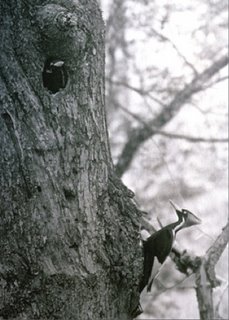
There is still no undisputable evidence. The paper they wrote is called "Evidence Suggesting that Ivory-billed Woodpeckers (Campephilus principalis) Exist in Florida." They are being careful not to assert any kind of certainty. They learned from the Cornell paper that has been criticized.
The only other woodpecker that could make a similarly loud knock are the Pileated Woodpeckers, but they do not do the "double-knock" like Ivory-bills, so until it is proven that Pileateds are capable of doing that knock I will be convinced I heard an Ivory-billed. And I still have no doubts of what Tyler saw.
A pic of a cavity from the site.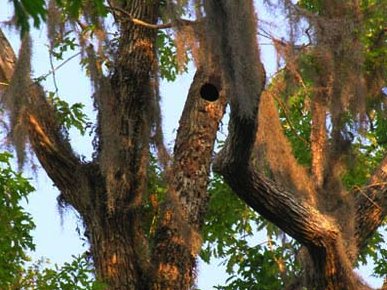
Here is Geoff Hill's Auburn site about the search.
I'm in here somewhere.
Here is the University of Windsor's IBWO site. They did all of the sound data.
Posted by
Chet
at
9:25 AM
0
comments
![]()
Labels: birding, Ivory-billed Woodpecker
Friday, September 22, 2006
Happy Birthday Bilbo and Frodo!!!!!
Today is Bilbo and Frodo's birthday! Join me in a pint of Butterbur's best beer and a toke on a pipe of Old Toby and wish them the best!!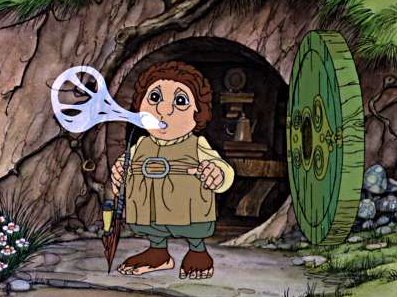
“In a hole in the ground there lived a hobbit. Not a nasty, dirty, wet hole filled with the ends of worms and an oozy smell, nor yet a dry, bare, sandy hole with nothing in it to sit down on or to eat: it was a hobbit-hole and that means comfort.”
Posted by
Chet
at
10:42 AM
0
comments
![]()
Saturday, September 16, 2006
Solar Energy
This week's Living On Earth had a good segment about solar power. I thought this little tidbit was interesting.
"Israel has actually a requirement on all new home construction to include a solar thermal system. Spain has the same requirement and Germany in fact has a strong demand for solar thermal systems. So just to give you some perspective, in the United States we are installing about 6,000 systems a year. In Germany they're installing 80-thousand systems per year, and in China they're installing 250-thousand solar water heating systems per year. So we are way behind the curve."
America is behind the curve? Whaaa? And with our government so worried about domestic energy.
And look at how much fun solar energy can be!
Posted by
Chet
at
7:00 AM
0
comments
![]()
Friday, September 15, 2006
Gluttony

Maybe this python's eyes were bigger than his stomach.
Posted by
Chet
at
10:55 PM
1 comments
![]()
Tuesday, September 12, 2006
Pilgrim At Tinker Creek
One of my favorite sections of Annie Dillard's Pilgrim At Tinker Creek
CATCH IT IF YOU CAN.
It is early March. I am dazed from a long day of interstate driving homeward; I pull in at a gas station in Nowhere, Virginia, north of Lexington. The young boy in charge ("Chick' at oll?") is offering a free cup of coffee with every gas purchase. We talk in the glass-walled office while my coffee cools enough to drink. He tells me, among other things, that the rival gas station down the road, whose FREE COFFEE sign is visible from the interstate, charges you fifteen cents if you want your coffee in a Styrofoam cup, as opposed, I guess, to your bare hands.
All the time we talk, the boy's new beagle puppy is skidding around the office, sniffing impartially at my shoes and at the wire rack of folded maps. The cheerful human conversation wakes me, recalls me, not to a normal consciousness, but to a kind of energetic readiness. I step outside, followed by the puppy.
I am absolutely alone. There are no other customers. The road is vacant, the interstate is out of sight and earshot. I have hazarded into a new corner of the world, an unknown spot, a Brigadoon. Before me extends a low hill trembling in yellow brome, and behind the hill, filling the sky, rises an enormous mountain ridge, forested, alive and awesome with brilliant blown lights. I have never seen anything so tremulous and live. Overhead, great strips and chunks of cloud dash to the northwest in a gold rush. At my back the sun is setting --how can I not have noticed before that the sun is setting? My mind has been a blank slab of black asphalt for hours, but that doesn't stop the sun's wild wheel. I set my coffee beside me on the curb; I smell loam on the wind; I pat the puppy; I watch the mountain. My hand works automatically over the puppy's fur, following the line of hair under his ears, down his neck, inside his forelegs, along his hot-skinned belly.
Shadows lope along the mountain's rumpled flanks; they elongate like root tips, like lobes of spilling water, faster and faster. A warm purple pigment pools in each ruck and tuck of the rock; it deepens and spreads, boring crevasses, canyons. As the purple vaults and slides, it ticks out the unleafed forest and rumpled rock in gilt, in shape-shifting patches of glow. These gold lights veer and retrack, shatter and glide in a series of dazzling splashes, shrinking, leaking, exploding. The ridge's bosses and hummocks sprout bulging from its side; the whole mountain looms miles closer; the light warms and reddens; the bare forest folds and pleats itself like living protoplasm before my eyes, like a running chart, a wildly scrawling oscillograph on the present moment. The air cools; the puppy's skin is hot. I am more alive than all the world.
Shadows lope along the mountain's rumpled flanks; they elongate like root tips, like lobes of spilling water, faster and faster. A warm purple pigment pools in each ruck and tuck of the rock; it deepens and spreads, boring crevasses, canyons. As the purple vaults and slides, it ticks out the unleafed forest and rumpled rock in gilt, in shape-shifting patches of glow. These gold lights veer and retrack, shatter and glide in a series of dazzling splashes, shrinking, leaking, exploding. The ridge's bosses and hummocks sprout bulging from its side; the whole mountain looms miles closer; the light warms and reddens; the bare forest folds and pleats itself like living protoplasm before my eyes, like a running chart, a wildly scrawling oscillograph on the present moment. The air cools; the puppy's skin is hot. I am more alive than all the world.
This is it, I think, this is it, right now, the present... I am patting the puppy, I am watching the mountain. And the second I verbalize this awareness in my brain I cease to see the mountain or feel the puppy. I am opaque, so much black asphalt. But at the same second, the second I know I've lost it, I also realize that the puppy is still squirming on his back under my hand. Nothing has chanaged for him. He draws his legs down to stretch the skin taut so he feels every fingertip's stroke along his furred and arching side, his flank, his flung-back throat.
I sip my coffee. I look at the mountain, which is still doing its tricks, as you look at a still-beautiful face belonging to a person who was once your lover in another country years ago: with fond nostalgia, and recognition, but no real feeling save a secret astonishment that you are now strangers. Thanks. For the memories. It is ironic that the one thing that all religions recognize as separating us from our creator -- our very self-consciousness -- is also the one thing that divides us from our fellow creatures. It was a bitter birthday present from evolution, cutting us off at both ends. I get in the car and drive home.
Posted by
Chet
at
6:25 PM
0
comments
![]()
Friday, August 25, 2006
Robert Penn Warren
So I've been trying to get some kind of handle on my thesis. I've decided on Robert Penn Warren's book "Audubon: A Vision." It has always been my favorite poem and now I'm starting to understand why. The myth of Audubon is an American myth and one in which I feel we should learn from (with Warren's help of course). Joseph Campbell talks about the loss of ritual and rights of passage that come with a loss of myth. To me this poem is a new myth for our age. A myth for the individual in the expanse and so called freedom of America. "Passion--what/is man but his passion?"
Penn Warren won three Pulitzers, two for poetry and one for his novel "All The King's Men." Towards the end of his life poetry was all he cared about. And it got better. I am amazed when I run into people who have never heard of him. Here's a stanza I return to often.
His life, at the end, seemed--even the anguish--simple
Simple, at least, in that it had to be
Simply, what it was, as he was,
In the end, himself and not what
He had known he ought to be. 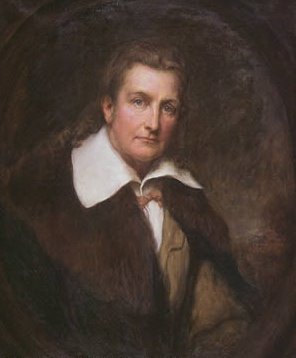
When I think about the first time I read this poem it mixes with so many memories of my childhood and my passing out of childhood.
VII Tell Me A Story
Long ago in Kentucky, I, a boy, stood
By a dirt road, in first dark, and heard
The great geese hoot northward.
I could not see them, there being no moon
And the stars sparse. I heard them.
I did not know what was happening in my heart.
It was the season before the elderberry blooms,
Therefore they were going north.
The sound was passing northward.
This passage mingles so much of what this poem means to me, from the beginning of wanting to write poetry to the importance of the small instances of my life to the power of my yearning to be a part of the "other" while still being only who I am.
For me the poem is deeply personal, but at the same time American and communal. Because art is communal. Audubon had to destroy that which he wanted to share. His art was how he came closer to the world. His ideal word. And the ideal is the only way humans can continue.
Tell me a story.
In this century, and moment, of mania,
Tell me a story.
Posted by
Chet
at
9:22 AM
0
comments
![]()
Monday, August 14, 2006
Two Years on Mars
The rovers Spirit and Opportunity have been on Mars over two years now even though they were made for a three month stay. I'm always amazed when I see the photos they send back. Here's a newer one I like.
For a nice flash program on the mission click here then click on +Flash Feature.
And as Jack Horkheimer says, "Keep looking up!"
Posted by
Chet
at
12:45 PM
0
comments
![]()
I love the smell of Walnuts in the morning!
The other day I picked up a walnut and had a rush of childhood memories. Good ones thankfully! Wow, the husks of walnuts have the most distinctive, wonderful smell in the world!
Posted by
Chet
at
10:56 AM
0
comments
![]()
Sunday, August 13, 2006
How Dumb Are We?
from National Geographic.com
This chart depicts the public acceptance of evolution theory in 34 countries in 2005. Adults were asked to respond to the statement: "Human beings, as we know them, developed from earlier species of animals." The percentage of respondents who believed this to be true is marked in blue; those who believed it to be false, in red; and those who were not sure, in yellow.
A study of several such surveys taken since 1985 has found that the United States ranks next to last in acceptance of evolution theory among nations polled. Researchers point out that the number of Americans who are uncertain about the theory's validity has increased over the past 20 years.
Posted by
Chet
at
1:11 PM
0
comments
![]()
Home On The Range
Have the tables turned?
August 2, 2006—Residents of Fort Providence in Canada's Northwest Territories are having a cow about their latest pest-control problem.
Several wild buffalo have invaded the small northern town (Canada map), rubbing siding off houses, head-butting trucks, and even scaring kids off the playground.
The nuisance bovines have been roaming Fort Providence since May, according to a report from the AFP news service. Officials believe the buffalo, which are part of a wild herd of about 2,400, were drawn to the town's manicured lawns and lack of predators.
"You're sure to run into one when you walk to the corner store for milk," the town's resource officer Darren Campbell told AFP.
"One of them kicked a vehicle. Try and get an insurance claim done after your car was kicked by a buffalo," Campbell said. "The adjustor will just laugh at you."
At least one buffalo in Canada discovered the ease of suburban living a few years back. This photo from April 2004 shows a trained buffalo named Bailey eating a meal with rancher Jim Sautner at his home in Spruce Grove near Edmonton, Alberta.
Meanwhile, most of Fort Providence's pesky critters have started moving back into the surrounding forests to search for mates. But two "trouble" buffalo were shot in mid-July for refusing to vacate. The town is now seeking buffalo-control officers to gently encourage the rest of the animals to leave.
—Victoria Gilman
Posted by
Chet
at
12:52 PM
0
comments
![]()
Thursday, August 10, 2006
AAAARRGGHHHH!!!!! Walk the plank you scurvy scallywag!!
Maggie and I went to Tall Ships Chicago. When I was a kid I was a huge pirate nerd. It was cool to get to see some ships up close. And if anyone wants to get me a Christmas present the last picture is what I want. Just under a grand!




Posted by
Chet
at
4:52 PM
0
comments
![]()
Saturday, July 01, 2006
Mimic
Check out this video of the Lyrebird. Watch to the end. It really is amazing!
Posted by
Chet
at
9:13 AM
1 comments
![]()
Get Them Varmints!!
I've witnessed these Prairie Dog target practices in the Cimmaron National Grasslands. If this is hunting my name's Daniel Boone!


Posted by
Chet
at
8:08 AM
0
comments
![]()
Friday, June 16, 2006
Where The Wild Things Are
The new makeup of the International Whaling Commision makes Dottie misplace her anger.
Posted by
Chet
at
7:35 PM
0
comments
![]()
Tuesday, June 13, 2006
Cat vs. Bear
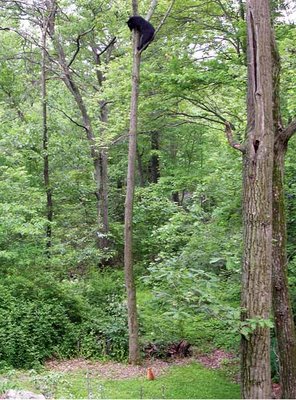
from NationalGeographic.com
June 13, 2006—Perhaps not since the Cowardly Lion has an animal's appearance been so at odds with its attitude.
On June 4 a black bear wandered into a West Milford, New Jersey, back yard, was confronted by a 15-pound (7-kilogram) tabby cat … and fled up a neighbor's tree. Hissing at the base of the tree, Jack the clawless cat kept the bear at bay for about 15 minutes, then ran him up another tree after an attempted escape.
Finally, Jack's owner, Donna Dicky, called the cat inside, and the timorous trespasser disappeared back into the woods.
"He doesn't want anybody in his yard," Dickey said of Jack in an interview with the Newark Star Ledger.
Unlike cats, bears aren't typically territorial, roaming instead over vast areas that would be impossible to patrol for intruders. Fairly common across North America, black bears are seen fairly often in this region of New Jersey.
Full-grown black bears weigh between 200 and 600 pounds (90 and 270 kilograms) and measure as much as 6 feet (1.8 meters) long. Their diets can include fruits, honey, insects, acorns and animals as big as moose calves—a fact apparently lost on Jack.
Posted by
Chet
at
6:18 PM
0
comments
![]()
Sunday, June 04, 2006
Rattlesnake Roundup
I'm not naive about hunting. My parents are hunters. I used to hunt. I'm not going to argue the evils of hunting. But I do have a problem with demonizing an animal and creating a festival out of its wholesale slaughter. Hey people, that story about the snake in the garden of eden, get over it!
Why don't we have a "Cattle Corralling" weekend out in Dodge City at a slaughterhouse? Bring the kids! Four stages! Brain a cow with a push of a button! All the blood you could ever hope for! Maybe I'm a little too pissed for a Sunday afternoon? I'm going to plant some herbs.
Posted by
Chet
at
3:32 PM
1 comments
![]()
Friday, May 26, 2006
Keats on the Big Screen
Who do you think will play Keats? I'm thinking Johnny Depp.
Jane Campion unveils drama on poet John Keats
New Zealand filmmaker Jane Campion will direct a drama based on 19th century poet John Keats.
At the Cannes International Film Festival, Campion said she was writing the screenplay for Bright Star, which follows the story of a three year romance between Keats and Fanny Browne.
The relationship came to an untimely end when Keats's life was cut short at age 25 in 1821.
Campion, who is based in Sydney, told The Hollywood Reporter that British poet Andrew Morton is working with her on the script, which has been commissioned and will be produced by Pathe UK. No production date has been set.
Short film part of UN feature
Campion was in Cannes this week with her new short film, The Water Diary, which screened yesterday out of competition.
The Water Diary is one of a series of eight short films commissioned by the United Nations that combine into a feature, called 8, highlighting issues of poverty, hunger, education and health in developing countries.
The short was shot near Cooma in NSW and tells the story through a child's eyes about living through a drought. It stars an unknown cast of children alongside well-known actors such as Justine Clarke and Russell Dykstra.
Film credits
Campion won the Palme d'Or in 1982 with her short Peel. She won the award again in 1993 for The Piano, for which she later won an Oscar for original screenplay.
Her other film credits include The Portrait of a Lady, An Angel At My Table, In The Cut and Holy Smoke.
The 59th Cannes International Film Festival closes on Sunday.
Posted by
Chet
at
1:57 PM
0
comments
![]()
Friday, May 19, 2006
Damn It Feels Good To Be James Burke
I was doing some internet sleuthing on James Burke, the creator of the documentary series Connections, and found that he has started a KnowledgeWeb Project. I can't wait to see how this turns out.
"The Knowledge Web today is an activity rather than a web site—an expedition in time, space, and technology to map the interior landscape of human thought and experience. Thanks to the work of a team of dedicated volunteers, it will soon be an interactive space on the web where students, teachers, and other knowledge seekers can explore information in a highly interconnected, holistic way that allows for an almost infinite number of paths of exploration among people, places, things, and events."
And this is just funny.
Posted by
Chet
at
1:18 PM
0
comments
![]()
Thursday, May 18, 2006
The Sunset Limited @ Steppenwolf
A few months ago I heard that Steppenwolf was putting on a play written by my favorite author, Cormac McCarthy (Blood Meridian, Suttree, All The Pretty Horses, etc..), so I bought a couple tickets. It was in the Garage Theater which is where they put on the more "cutting edge" shows. When we got there I was amazed to see the man himself, Mr. McCarthy or as I now call him, Big Mac. Well actually I was a bit intimidated so I sent Maggie to get his autograph on the playbill. I am a wuss, yes. Then he sat right in front of us! It really is amazing how being in the presence of someone like that can turn you into a blubbering pool of schmutz. The play itself was amazing. The basic premise is a religous black man saves a non-religous white man from killing himself. The rest is a dialogue between the two. I really can't recommend it enough. Anymore would give away too much and you really must go and see it. This is our second Steppenwolf play and we can't get enough. Each individual performance is such a once and a lifetime event. Yes, you can go the next day and see it again, but it isn't the same play. And the theater only sat about 80 people so it really is an intimate affair. I want to go see the Don Delillo play Love Lies Bleeding, but it is a little more pricey so we'll have to go with student standby tickets.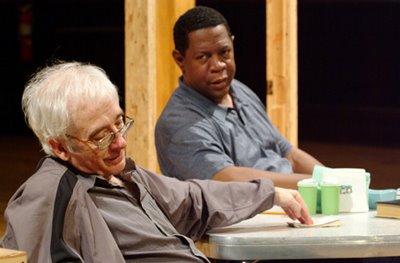 Austin Pendleton (left) and Freeman Coffey (right)
Austin Pendleton (left) and Freeman Coffey (right) Cormac McCarthy
Cormac McCarthy
After the play I got the nerve to ask him (Big Mac) to sign our other playbill for my friend Steve, who may be an even bigger admirer of his than myself. But of course nothing of any intelligence would come out of my mouth. I said something about enjoying his work, shook his hand and then ran away like a wee child.
Posted by
Chet
at
11:23 PM
0
comments
![]()
Labels: Cormac McCarthy, Steppenwolf




















